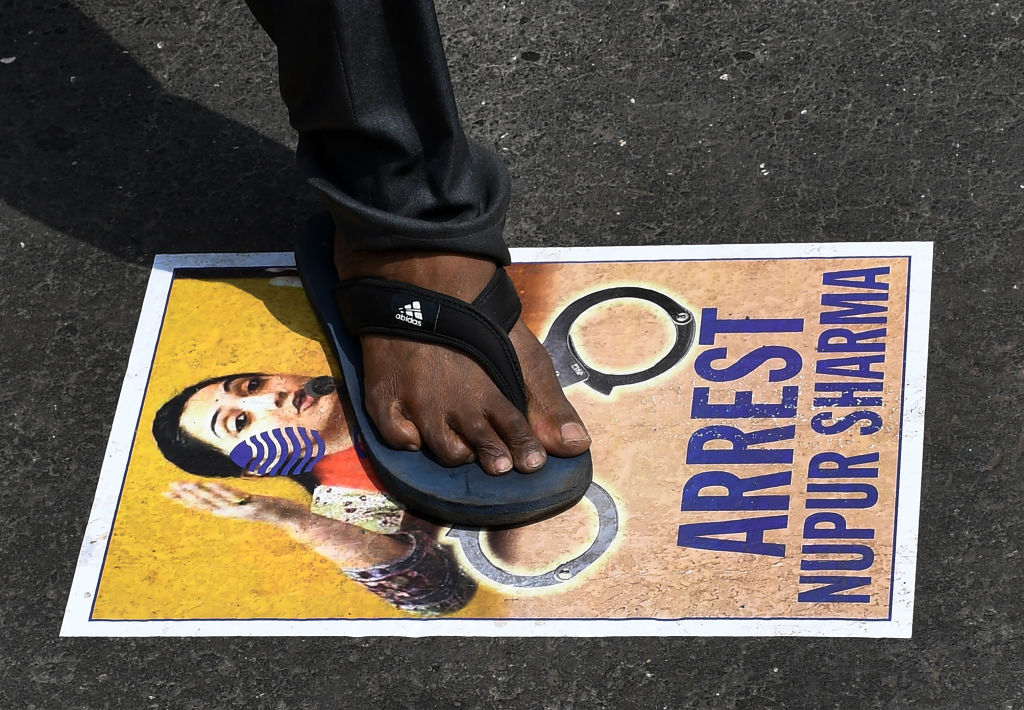What happens in India no longer stays in India
Posted By Ramesh Thakur on June 9, 2022 @ 14:30

The more India’s economic weight, geopolitical clout, diplomatic heft and global profile grow, the more domestic events will attract outside attention and have international consequences. The latest example of this is Islamophobic comments made by two senior officials of the ruling Bharatiya Janata Party (BJP) that have roiled relations with Arab and Islamic countries which have been courted by the Modi government with considerable success [1]. Deepak Mittal, India’s ambassador to Qatar, said that the remarks from some ‘fringe elements’ didn’t represent the views of the government. This is risible: since when is a national spokesperson of the governing party a ‘fringe’ element?
Nupur Sharma was a national spokesperson of the BJP and Naveen Jindal was media head of its Delhi unit. Sharma’s derogatory reference to Prophet Muhammad was made in a TV debate last month and Jindal’s remarks were posted on Twitter. The Indian papers haven’t reprinted their comments, and the BBC explains [2] this is because ‘they are offensive in nature’. Both have been sacked from their official posts and their example should serve as a warning to others to make sure their brains are fully engaged before they open their mouths to speak.
The controversy throws into sharp relief important lessons and implications, not all of which are positive, for Australia and the other Quadrilateral Security Dialogue members. It would be a pity if the slippage in the liberal democratic principles that have served India extraordinarily well were to undermine its material and values-based attractiveness to Australia just as the bilateral relationship is poised to take off.
One of the biggest contemporary challenges for liberal democracies is how to manage pluralism and diversity without undermining national unity and social cohesion. Given its scale and incredible linguistic, religious and ethnonational diversity, India has been the best exemplar of E pluribus unum—‘Out of many, one’, the motto on the Great Seal of the United States. At more than 180 million, Muslims are the country’s most substantial religious minority (14% of the population). India’s three great political institutions of democracy, federalism and secularism have accommodated them as full-fledged participants and stakeholders.
Gradually, however, the Congress Party, in power for several decades after independence in 1947, began to pander to the Muslim ‘vote bank’ as a core constituency. Hindus became increasingly hostile to the continual appeasement of Muslim demands for special treatment. The single biggest fillip to the rise of the BJP as a political force was the landmark Shah Bano case [3] in the 1980s when, chasing Muslim votes, PM Rajiv Gandhi used his three-quarters majority in parliament to retroactively negate a Supreme Court judgment granting alimony to a Muslim woman divorced by her husband.
Common pejoratives in India’s current highly charged public discourse include ‘sickularists’, pseudo-secularists and ‘minorityism’. Rights and opportunities available to any citizen should be available to all without regard to sectarian identity, else a backlash will brew. Most people are innately decent and support nondiscriminatory equal treatment for everyone, but resent and will resist unequal identitarian privileges.
Having successfully mobilised Hindu anger to capture and consolidate political power, the BJP pushed the pendulum too far. Instead of equality in legal theory and state practice, the government has engaged in sophistry and dog whistles essentially to put Muslims in their place in a ‘Hindu-first’ new India. Prime Minister Narendra Modi has been complicit through prolonged silences despite clear evidence of hate speech and violent attacks including killings of Muslims. Already by 2015 I warned that India risked turning into a ‘Hindu Pakistan [4]’ that ‘othered’ religious minorities, in particular Muslims. The situation has got worse since then and its ramifications are spilling across borders.
This is potentially a serious threat to India’s political stability and social cohesion and a distraction from urgent economic reforms. The reality of 180 million Muslims spread across India means that if they become badly disaffected, outbreaks of communal violence and terrorist attacks could destroy the country. One of the four critical anchors of the Quad would then collapse, and that could only degrade Australia’s strategic environment across the vast Indo-Pacific.
The Quad has been promoted as a grouping of the Indo-Pacific’s four most consequential democracies. It is particularly humiliating for India’s commitment to liberalism to be called out by some of the world’s most illiberal regimes. At a time when India is already under attack in Europe and the US for its fence-sitting on the Russian invasion of Ukraine [5], it can ill afford still more reputational damage in the Islamic world. Nor can it brush aside these criticisms as continuing examples of neocolonialism and a carryover of the white man’s burden [6].
US Secretary of State Antony Blinken has also recently criticised India [7] on lacklustre protection of religious minorities. In an earlier article, I noted how India’s growing democracy deficit [8] has been recorded in several world indexes from the Economist Intelligence Unit, Freedom House and the Varieties of Democracy project based in Sweden. Writing in The Interpreter in March 2020, Ruchira Talukdar and Priya Chacko [9] urged Australia too to speak out on India’s democratic crisis. I think some of the criticisms of India are overdone and they also ignore some serious departures from liberal practices in Australia and the US in recent times. Even so, they do point to the uncomfortable truth that as India becomes a more significant regional and international actor, what happens in India no longer stays inside India.
Article printed from The Strategist: https://www.aspistrategist.org.au
URL to article: https://www.aspistrategist.org.au/what-happens-in-india-no-longer-stays-in-india/
URLs in this post:
[1] with considerable success: https://theprint.in/opinion/global-print/modi-moved-heavens-to-mend-ties-with-arab-world-but-nupur-sharma-tejasvi-surya-hurting-it/986533/
[2] BBC explains: https://www.bbc.com/news/world-asia-india-61701908
[3] Shah Bano case: https://indianexpress.com/article/what-is/what-is-shah-bano-case-4809632/
[4] Hindu Pakistan: https://thewire.in/politics/we-need-to-stop-turning-india-into-a-hindu-pakistan
[5] fence-sitting on the Russian invasion of Ukraine: https://www.aspistrategist.org.au/indias-stake-in-the-ukraine-conflict/
[6] white man’s burden: http://historymatters.gmu.edu/d/5478/
[7] criticised India: https://www.thehindu.com/news/international/increased-attacks-on-people-places-of-worship-in-india-blinken/article65488338.ece
[8] growing democracy deficit: https://www.aspistrategist.org.au/indias-growing-democratic-deficit/
[9] Ruchira Talukdar and Priya Chacko: https://www.lowyinstitute.org/the-interpreter/australia-should-speak-out-india-s-democratic-crisis
Click here to print.